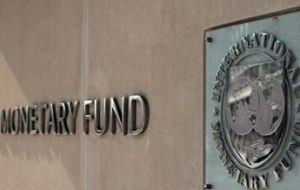MercoPress. South Atlantic News Agency
Global economic prospects fragile and downside risks higher, says IMF
 IMF specifically identifies as risks the Greek crisis and the US impasse
IMF specifically identifies as risks the Greek crisis and the US impasse The International Monetary Fund called on emerging G-20 economies for a rapid macroeconomic policy tightening and demand rebalancing, while “pragmatic use of macro-prudential tools may be needed to manage large capital inflows”.
In a brief report on global economic prospects and challenges the IMF also points out that advanced G-20 economies need credible medium-term fiscal consolidation, balancing short-run growth fragility with fiscal sustainability and the support of an accommodative monetary policy.
IMF underlines the risks of not solving the Greek crisis, the urgent need to reduce threats of contagion and growing markets’ concern over the lack of credible medium-term fiscal plans in advanced countries, notably the United States.
“The risks of not solving the Greek crisis are severe and a greater sense of urgency is needed to address the crisis and reduce the risks of contagion”, says the IMF.
“There is concern about debt sustainability and support for adjustment efforts in Europe’s periphery which is leading to increased market worries about potential contagion”, points out the fund adding that risks from the lack of credible medium-term fiscal plans are also elevated in other advanced countries notably the United States, where a deadline for raising the debt ceiling looms large.
By contrast, overheating pressures in many emerging and developing economies are intensifying, as exhibited by rising inflation and rapid credit growth. In effect low interest rates in major advanced economies continue to push investors into riskier assets in a search for higher yield, potentially generating financial imbalances particularly in some emerging markets.
Among the policy initiatives, IMF says that advanced G-20 economies need to put in place credible medium-term fiscal consolidation that balances short-run growth fragility with fiscal sustainability, while monetary policy should support fiscal adjustment and stay accommodative where there is economic slack.
In emerging G-20 economies, more rapid macroeconomic policy tightening and demand rebalancing is needed in some cases while pragmatic use of macro-prudential tools may be needed to manage large capital inflows.
Overall “policy initiatives are urgently needed to make financial systems resilient to new systemic shocks”.
As to global economic prospects, the IMF states that world growth in the first quarter of 2011 was broadly in line with its expectations and although activity in most advanced economies has slowed in the second quarter the slowdown is expected to be temporary.
“Overall, the outlook for global growth in 2011–12 remains broadly unchanged compared with the April 2011 World Economic Outlook, but with considerable differences among economies”, points out IMF.
However growth is expected to remain sluggish in advanced economies faced with household, fiscal, and financial sector balance sheet problems, but strong in many emerging and developing economies.




Top Comments
Disclaimer & comment rulesCommenting for this story is now closed.
If you have a Facebook account, become a fan and comment on our Facebook Page!